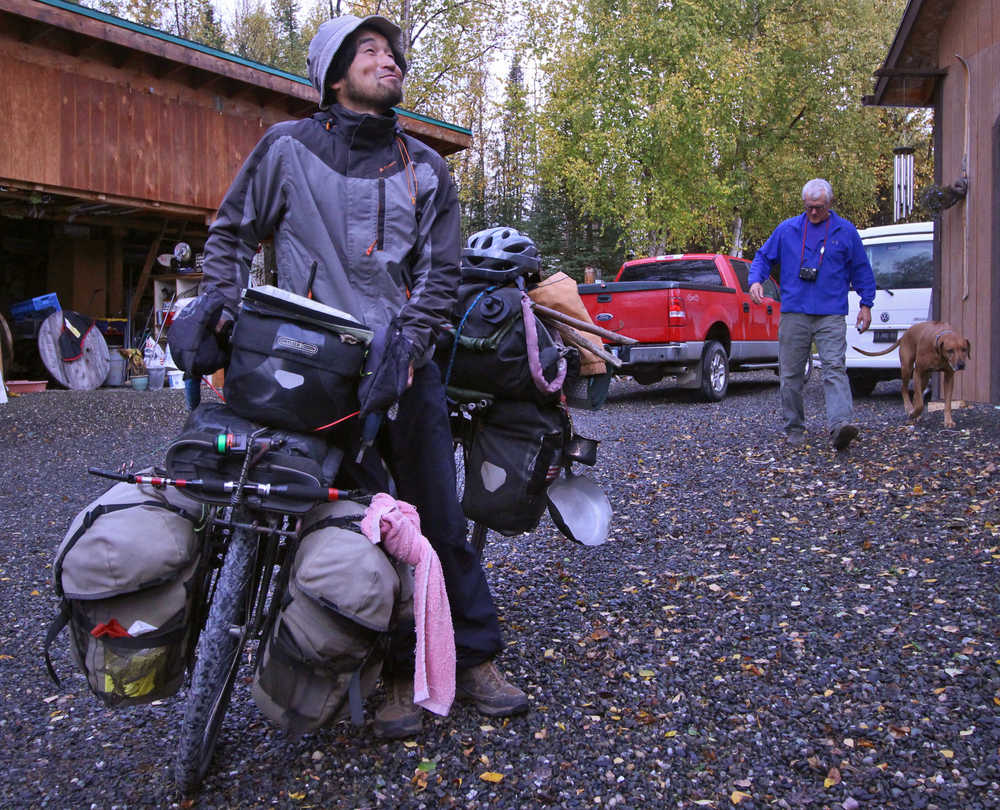This summer Robert and Dawn Stiver and their son Zach were caribou hunting around mile 85 of the Denali Highway. Stopping to pick berries by the roadside, they saw a man pedaling toward them on a bicycle laden with full panniers and strapped-on camping gear. When the cyclist stopped to take in the view of the Susitna River valley and the surrounding mountains, he and the Stivers struck up a conversation, and they asked him to join their berry picking.
The man was Japanese long-distance cyclist Hiromu Jimbo, who in 2009 began riding from Istanbul, Turkey across southern Europe and crossed the Strait of Gibraltar to Morroco. After a two-year ride down to South Africa, he returned to Japan for five months before setting out again from Mumbai, India and riding through Central Asia and the Middle East into Europe, eventually reaching Scotland. From there he flew to Vancouver and made his way to Alaska.
Jimbo was heading back south when the Stivers met him — he said his destination was Homer. Robert Stiver invited him to stay at their place near Mackey Lake Road when he came through Soldotna. This week, Jimbo accepted the invitation.
After taking a break to spend a day with the Stivers shopping for supplies, fishing at Soldotna’s Centennial Park and picking more berries, Jimbo left for Homer Wednesday morning. Once he’s biked to the Sterling Highway’s end on Homer Spit, he’ll turn around and head back north to Whittier to catch a ferry to Valdez, which has a cheaper fare from Whittier than Homer. From there he’ll go north to Tok and cross into Canada’s Yukon territory, where he’ll spend the winter with a friend in a village. When spring comes again, he’ll be riding across Canada, then down into the American east coast. And from there?
“When I’m satisfied, I’ll finish,” Jimbo said, adding that he plans to keep riding for several more years.
“This vehicle has a really nice speed to meet people and see scenery,” Jimbo said of his bike and his reasons for riding it. “When I started sports bicycling, I was a student. This makes my world very wide and big. I was living in a small place and the bicycle expanded my world.”
Before leaving Japan to bicycle, Jimbo said he worked for a travel agency and saved money “every month, every year, every second” for his trip. Since leaving Japan, he’s only worked occasional odd jobs — writing a few articles for Japanese sports magazines, he said, working in a plant nursery and joining a Japanese construction crew building schools in Africa.
Jimbo said he tries to pick up local languages wherever he goes, but has only occasionally reached conversational proficiency, especially in language-dense Africa and India. For the most part, he said, he’s relied on English as a lingua franca — or failing that, hand gestures. Making acquaintances such as the Stivers has been a different experience in each place he’s gone through. In some it’s a challenge, while other places are like Iran, where he said “every hour the people I meet on the road invite me, so it was so hard to go ahead.”
Early in his trip a light was stolen from his bike — in either Bulgaria or Romania, he couldn’t remember which — but aside from that Jimbo couldn’t think of problems he’s had with theft. Illness has struck a few times. In Africa he said he got diarrhea from water he drank and malaria from a mosquito bite, and was delayed 30 days waiting for a rabies shot after being bitten by a dog. When asked if he’d ever thought of ending his trip, he said he did so often.
“I fear, sometimes when I get weak,” he said. “Why am I doing this? I want to go back home. But always, again, I can be strong from talking to people, or excitement I feel from nature. Then I get power again.”
Robert Stiver said he’d weighed Jimbo’s fully-laden bike and found that it weighed 154 pounds. His gear includes a tent, tarps, groundpad and sleeping bag, a collapsible shovel, food, a pan and cup strapped to his back pannier, a pink towel tied to the front, and two hefty wooden sticks he uses to stabilize his parked bike. One of them he picked up in Angola. The other he said was from Tajikistan.
Most of his gear he’s carried since the start of the trip, Jimbo said, though some of it he’s picked up more recently. A man in Scotland gave him a gas camping stove, and a Japanese hunting and fishing guide living in Anchorage gave him a collapsible fishing pole, though he has yet to catch a fish with it, but may take up ice-fishing during his winter in Yukon. Robert Stiver, a craftsman who makes belts from old bicycle tires and sells them online, gave Jimbo a sewing awl used for stitching leather, saying it would be useful for repairing the torn seat of a collapsible tripod camp stool Jimbo carries. Before he finished packing his bike in their garage, Dawn and Robert had also given him a bag of brown rice, a hat to wear under his bike helmet, and some hot water to fill his thermos. He declined coffee.
“Remember to send us an email,” Dawn Stiver said to Jimbo, just before he mounted his bike and coasted out of the Stivers’ driveway. “Once a year, tell us where you are!”
Jimbo turned back to smile and wave as he reached the bottom of the driveway, rounded the corner, and was gone.
Reach Ben Boettger at ben.boettger@peninsulaclarion.com.

